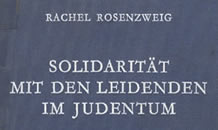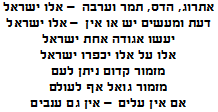continuation
of Rafael Rosenzweig's translation of the original summary
of the PH.D. thesis delivered to the Jerusalem University on Purim 1972
DIGEST - FIRST PART:
THE PERCEPTION OF SUFFERING
IN THE THOUGHT OF THE SAGES OF ISRAEL
I.1 The Approach to the
Suffering of All Beings
1.2 The Approach to the
Suffering of the Community
I.3 The Approach to the
Suffering of the Individual
(Your Fellow's Suffering)
|
[motto]
What matters today is not the difference
between believers and unbelievers,
but that between those who care and those who do not care.
Abbe Pire, Nobel Price Winner for
Peace, 1958 |
The perception of human suffering is
not frequent among Israel's Sages.
The suffering of the "righteous"
or the martyrdom of the messianic apostles for one,
and on the other hand the suffering of Israel,
were stronger, more real
and relegated the perception of that suffering which is common to all
men
to a secondary place.
In spite of this, a number of Sages
are noted,
who recognized the suffering common to all:
"Ecclesiastes", as a representative of the "pre-apocalyptical"
period,
Paulus as a representative of the hope of an apocalyptical messianic
delivery,
"Ezrah" as a representative
of the clash
between apocalyptical individualism and biblical-rabbinical solidarity,
and Rabbi Shmuel bar Nahmani as a representative of rabbinical eschatology.
Some Sages were aware of a particular suffering common to all nations,
namely drought,
and some of them went as far as to belittle
the importance of the apocalyptical consolations,
since those do not include all the suffering of the world.
Some of these Sages attach more, some less importance to human suffering.
Common to all is the lack of application
regarding actual relationships between nations.
Taking part in the sorrow of others did not result in actual solidarity.
1.2
The Approach to the Suffering of the Community
Their nation's suffering
was much more real and known to Israel's Sages
than human suffering in general.
It may be said that the nation's suffering
was the focal point of Israel's conception of history, from its very
beginnings.
At first, Israel's suffering was not worse than that of other nations,
but its singularity was created, among other factors,
by its capacity to cope with their suffering
and to accept the responsibility for their fate.
The capacity to cope with the nation's
suffering expresses itself also in the fact
that the "literature of calamities" forms a central part in
Israel's literature at large.
"Purim Scrolls" were popular,
because the listeners were able to identify with the suffering,
about whom the scrolls were written.
A more important occurance is the literature of laments,
which not only immortalizes Israel's defeats,
but also indicates the nation's fault resulting in these defeats.
The courage to plead responsibility of the nation and,
at the same time, to cause it to bear up to the situation,
stands out if compared to two other types
of literate reaction to the suffering of the nation:
tales about victories and heroism in the past,
and dreams about delivery and revenge in the future.
Compared to these impotent illusions,
the honest conception of history,
which is a hall-mark of Jewish thought,
is the more striking.
The dual aim of the literature of laments,
which is of special interest in this paper,
is that of the identification of the individual with the community as
a fact,
and that of God with his people as a demand.
The demand from heaven becomes the more important,
as the identification of the individual with his people deepens.
The significance of identification with
the suffering,
as one deals with the suffering of Israel,
stands out, when the attitude of the Christians is examined.
The messianists did not leave the community out of their own will,
as the Dead Sea Sect did,
but were forcibly expelled.
However, the blame of expulsion which falls on Israel
does not justify the satanic ideology of anti-solidarity,
which was developed by the Christians regarding the suffering of Israel.
The lack of identification with suffering Israel
caused the final rift between the two religions
and prepared the ground for future calamities.
This lack of solidarity also dismissed Jesus' lifework,
which included solidarity with his people.
He, who was supposed to provide guarantorship for all men,
made his own people, in its entirety,
guarantors for the murder of the one.
The attitude of the sages of Israel
is an entirely different one.
They as well stated the nations' responsibility for its suffering,
but the source of their reproof was complete identification,
and not the hostile judgment of a bystander.
Ezra the Seer once again serves as the prototype of the man
who identifies with his community.
This identification underscores the illusion and the danger
inherent in apocalyptic individualism,
which served as a refuge to many, including Ezra himself.
Most of the sages approach Israel's
suffering
in a less theoretical and more practical way.
The perception of Israel's suffering was at once translated
into measures of reconstruction.
When brute force had failed,
they had to find an alternative way to cope with suffering.
One of these ways was Rabbi Akiba's message of consolation.
This message was based on a new theology,
according to which God was described as a lover,
and which expressed itself mainly in the Midrash to the Song of Songs.
As a result, the self-esteem of Israel was raised,
and the perception of suffering became accompanied by pride;
Love between God and Israel was stronger than death itself.
I.3
The Approach to the Suffering of the Individual
(Your Fellow's Suffering)
Neither in the sages' philosophy nor
in that of the messianists
is the approach to the suffering individual an outstanding theme.
Instead of feeling the fellow's pain,
people preferred to judge him,
in the manner of Job's friends.
This point of view was also the common one among the sages of Israel,
in spite of an explicit Baraitha forbidding such judgment.
It also was the decisive approach of the Christians
- in its application towards the smitten nation - ,
in spite of Jesus' explicit warning
that people, in order to save their lives,
should always search their own actions if in trouble
but never the actions of others.
The suffering of the individual plays
an important part
as a "deterrent" within the framework of "reproof".
However, the nation's teachers were not interested in the suffering
person,
but in the suffering per se.
A further view-point, and an important
one, is that of the community;
is it responsible for the suffering individual?
In this case, Paulus proves to be a deep thinker;
the community's participation in the troubles of the poor
is not a matter of abusive pity and of private initiative.
It is a matter of mutual solidarity and of public duty,
both a direct consequence of the fact of mutual dependency.
The suffering of the individual as a public problem
also serves as a theme in the philosophy of the sages.
Expulsion of the suffering or their healing
are the two detrimentally opposed solutions of the problem.
But even in these discussions,
the problem of the sufferers themselves is not approached.
The few personalilties who did partake
in the grief of those
that were denied the chance to live as they themselves were able to,
stand out in every generation on the background of this general wasteland.
One of them was Jesus of Nazareth,
who went beyond the established opinion in his teaching
and, even more so, in his practice.
In the early time, no one equals him
in his perception of the individual's suffering
and in his concrete identification
with the exception of his brother in the spirit,
R. Joshua ben Levy, about 200 years later.
Yet even these two failed to reach Mose's stature, who remained unequalled
in the way he partook with the pains of the oppressed wherever he found
them.
It is not only interesting to find out
who among the sages of Israel dealt with the suffering individual,
but also with what type of suffering they dealt.
I found a full-scale approach only to the bastard and the poor.
As for the poor, it proved to be necessary to study also the practical
approach.
I distinguished between motivation for charity
and between the charitable action itself.
The motivation of reward in general and the need to atone in particular
implied, sometimes, a justification of poverty.
I tried to understand this rather dangerous justification
as a gimmick designed to generate economic participation of people
in the troubles of the poor.
Despite this, it is impossible not to criticize this abuse of the poor
in using them as a means and as an object.
In this criticism we have the right to rely on those sages
that searched thoroughly into another type of motivation
for an approach to the suffering of the poor.
Reference is made to identification with them,
as the Torah and chapter 58 in Isaiah teach us.
The polarity between an approach
of identification with the suffering and the lack of it
is symbolized - and even exaggerated - in two tales,
one about R. Nahum of Gamzu
and the other about R. Shimon bar Yohai.











